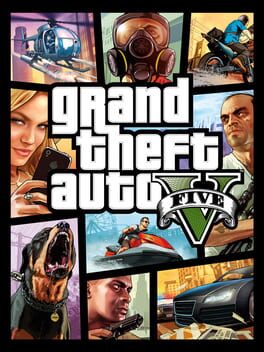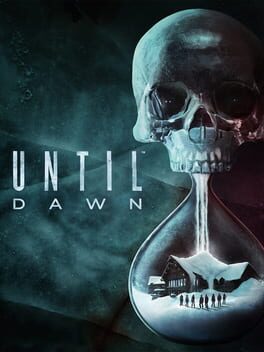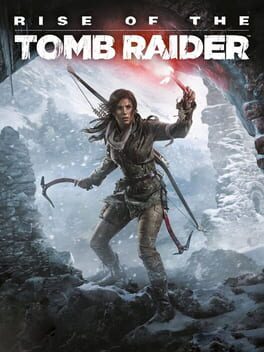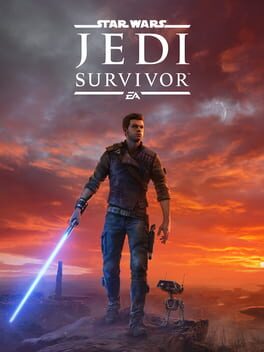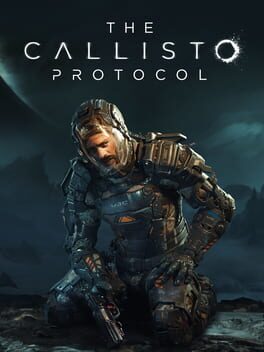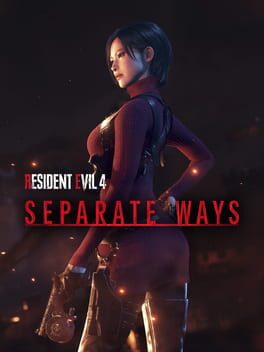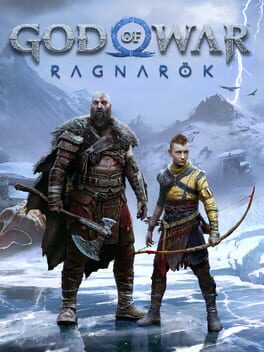ImmortanJones
2013
This review contains spoilers
Confused by what critics saw in this over a decade ago that led them to unanimously praise its static, abrasive protagonists on their quest to deliver uninspired social satire in a sandbox full of chores-- I mean, "missions." It's a beautiful sandbox, don't get me wrong, just one that facilitates a clunky expression of the game's ideas and characters. Rockstar isn't subtle, and I wouldn't expect nor want them to be subtle, it's just that their commentary on Americana used to have some bite. In the case of Red Dead Redemption, it even had heart! Nico Bellic's tragic immigrant story, Max Payne's furious mid-life crisis, or John Marston's spectral presence in a changing world are so much richer than what Grand Theft Auto V delivers through its unruly, psychotic leading men. Franklin gets the closest thing to a character arc in this whole endeavor. Despite being the least corruptible jackass in the crew, he also has the least personality and agency in the narrative. Michael almost reaches some form of interesting development when his family abandons him (rightly) for being a serial criminal, but then they just flock back into his good graces after he... continues being a serial criminal. And Trevor? Trevor is Grand Theft Auto's id made manifest. Every impulse from every 13-year-old that ever chuckled at the idea of murdering virtual prostitutes. How does that sustain narratively? It doesn't. He's just obnoxious to watch and drives whatever pathos you might have for the motley gang into the ground as they're all forced by gameplay conceit to keep him around. We get it, Rockstar, Los Angeles is a vapid, celebrity-obsessed wasteland that incentivizes avarice, malice, and backstabbing tendencies, but what does that have to do with extrajudicial torture and why is it a minigame?
2018
2015
This review contains spoilers
Supermassive Games' breakout foray into the world of kitschy teen horror via this gorgeously-rendered and performed CYOA game is still the studio's highest watermark after all these years. It's difficult not to compare Until Dawn to its successors, The Dark Pictures Anthology, in which the cinematic formatting, star-studded casts, and consequential decision-making rarely hold a candle to their implementation here. The naturalism of the characters in concert with the tropes and subversions inherent in slasher media form a palpably honest experience laden with the gory glory of 1990s schlock-busters and contemporary torture porn. I just get the biggest kick out of Rami Malek's turn as the unassuming, grieving faux-serial killer, the off-kilter energy of his portrayal cementing him as the rising star he was then and the commanding presence he is now. All this beating around the bush when the point I really want to communicate is that fixed-camera horror is still the best format in games, and I sincerely hope they don't diminish the experience with the upcoming remake. Oh, those fancy performance captures are aging, all right. Guess Supermassive is ready to join the hyper-realism arms race with Naughty Dog, Guerrilla, and KojiPro.
2020
Undeniably transfixing in its complexity, polish, and presentation (though not without major drawbacks elsewhere), Baldur's Gate 3 earns its reputation and accolades by being a monumental leap ahead for role-playing games, a titanic fantasy epic that pools its mechanics from table-top role-playing to approximate the ultimate Dungeons and Dragons experience from the comfort of your console. It's narrative heft can't hold a candle to the likes of BioWare's seminal space operas nor CD Project RED's deferential monster-hunting pseudo-sequels, but its depth, design, quantity, and quality more than make up for the bog-standard dungeon-master duels and uninteresting antagonists. The fact that you can do it all with friends is astounding all on its own.
2024
Always a good sign when you boot up a tech demo and the frame rate hitches for a solid minute during the opening cinematic. I don't have any real dog in the "classic versus modern Silent Hill" debate; Konami, the speculator market, and the ravages of time have made it damn near impossible to quickly boot up the analog horror masterworks of yore while their maligned contemporaries are just making their way to market. So speaking as a newcomer - thanks, I hate it!
Silent Hill: The Short Message is the American History X of video games: an unsubtle, dog-eared attempt at tackling serious subject matter with all the grace of a sledgehammer. Points for some liminal FMVs and Akira Yamaoka's backing instrumentals, but otherwise, this hyper-linear puzzle game for the 13 Reasons Why crowd has nothing to offer that wasn't pilfered directly from Hideo Kojima's 10-year-old "playable teaser", beginning a new wave of interest in the series before Konami summarily deleted its existence from their portfolio (and yours if you were foolish enough to let it escape your PlayStation hard drive).
Konami's remedial understanding of trauma and suicidal ideation is so inept, they have to flash a trigger warning accompanied by the number for the suicide hotline during every loading screen because a textual reading of the game essentially tells you to take a dive off the nearest high rise when people on Twitter call you a "LOSER" or an "IDIOT." "Show us sexy pics!" screams the mob. "I'm 14 and this is deep!" responds your protagonist. On my social media feed, I see that town...
A worthless download that may cost nothing, but will force you to pay with your time, sanity, and hopes for a better future. Not nearly short enough.
Silent Hill: The Short Message is the American History X of video games: an unsubtle, dog-eared attempt at tackling serious subject matter with all the grace of a sledgehammer. Points for some liminal FMVs and Akira Yamaoka's backing instrumentals, but otherwise, this hyper-linear puzzle game for the 13 Reasons Why crowd has nothing to offer that wasn't pilfered directly from Hideo Kojima's 10-year-old "playable teaser", beginning a new wave of interest in the series before Konami summarily deleted its existence from their portfolio (and yours if you were foolish enough to let it escape your PlayStation hard drive).
Konami's remedial understanding of trauma and suicidal ideation is so inept, they have to flash a trigger warning accompanied by the number for the suicide hotline during every loading screen because a textual reading of the game essentially tells you to take a dive off the nearest high rise when people on Twitter call you a "LOSER" or an "IDIOT." "Show us sexy pics!" screams the mob. "I'm 14 and this is deep!" responds your protagonist. On my social media feed, I see that town...
A worthless download that may cost nothing, but will force you to pay with your time, sanity, and hopes for a better future. Not nearly short enough.
Maybe the second biggest failing of Crystal Dynamics' reinvention of Lara Croft is that she's not a total beefcake from all the absurd acrobatics, death-defying mountain scaling, and Mano y Mano fistfights with shadow government terrorists. After all that running and jumping, you'd think she'd have quads to rival Chun Li.
It seems the time when Star Wars set out to do anything interesting has long since past (Andor innocent, of course). Fallen Order may not have been reinventing the wheel, but its earnest attempt at chronicling a hero's journey while structuring itself around previously established canon managed to be compelling, evocative, and generally entertaining... though not without jank. Rather than lean into the elements of Fallen Order that set itself apart from every low-rent FromSoft pastiche that has become popular this past decade, Jedi Survivor doubles down on poor optimization, a widening and flattening of its design (say "hello" to a vacuous open-world!), and a true-blue nothing-burger narrative that constantly prods at ideas and stories that would have been infinitely more exciting to experience. I can't decide what I hate more: this game genuinely attempting the same death screen fakeout as God of War: Ragnarok or how mechanically redundant "embracing the darkness" becomes once you get to the point in the game where it remembers it can contrive an internal struggle for Cal. Can you believe they put Vader in this shit again?
The derivative brainchild of a moron that thought being in the same building as the developers who created the original Dead Space gave him any understanding of what made that game a celebratory benchmark, The Callisto Protocol is a clunky, lifeless mess of an experience hampered by an even clunkier, sleepwalking narrative. Contemptibly stale in nearly ever facet of design, this bumbling pastiche of every space horror trope in existence offers players the chance to test their patience with plodding hyper-linear navigation and turgid melee combat that becomes an unbearable slog on higher difficulties. (It's like Striking Distance knew they weren't cooking and had to automate dodging so their QA department wouldn't rip their fucking spines out.) Unlike its obvious influences, the game does not understand how to build tension or craft genuine horror, with some hilariously tripe jump scares sprinkled throughout its anemic runtime to jolt the player awake between bouts of mindless pathfinding through the same gray hallways they've seen in countless other, better games. The gall to structure its story with a deflating cliffhanger in mind as both a consequence of micro transaction grifting (buy our season pass to see how it really ends!) and an unearned confidence is truly the icing on this shit sundae, and I'll be glad to never find out the fates of what's-his-name and who-fucking-cares.
1998
MASTER COLLECTION: VOL. 1
Age hasn't slowed you down one bit.
Taking the opportunity with Konami's latest milquetoast repackaging of these iconic games to finally lay down the law on Hideo Kojima's gobsmacking exercise in tactical espionage action. In short: life-affirming, blockbuster spy craft with an anti-nuclear edge that takes the cornball trappings of James Bond to tell a story that could only be designed for a medium it was intent on changing forever. After all this time... pure bliss.
Age hasn't slowed you down one bit.
Taking the opportunity with Konami's latest milquetoast repackaging of these iconic games to finally lay down the law on Hideo Kojima's gobsmacking exercise in tactical espionage action. In short: life-affirming, blockbuster spy craft with an anti-nuclear edge that takes the cornball trappings of James Bond to tell a story that could only be designed for a medium it was intent on changing forever. After all this time... pure bliss.
2023
This review contains spoilers
This story is a monster.
Kill your darlings.
The moment I fell head over heels for this game comes very late in Alan's half of the story. The titular author is still trapped in the Dark Place, visualized now as a cracked mirror version of New York City that is ever shifting, full of restless spirits, and submerged in impenetrable darkness. Alan's goal, as was his goal in the previous game, is to write his way out of the Dark Place, to craft a new manuscript that will save him and those he cares about. Through gameplay, you find points of interest in the Dark Place that inspire Alan to write, and his ideas shape the world around him, allowing him to access parts of this inverted reality that will bring him closer to his escape. After each draft of his new manuscript is complete, he is urged toward a replica of the apartment he and his wife, Alice, lived in before their fateful trip to Bright Falls. It is here that Alan learns what became of Alice in the 13 years since his disappearance.
Alice became a photographer. Well, she had been a photographer for years, but Alan's star had always eclipsed her own, and without him and his emotional abuse around the apartment, she was able to create for herself again. And then one day, Alan returned. Meaner. Colder. Not quite who she remembered. Not quite who she believed. This new torment led her to create an exhibition of candid photography she had taken of "Alan." Her nightmares made manifest. But the pain was too great. Her first exhibition was to be her last.
Alan - the real Alan - blames Mr. Scratch, a dark presence within the dreamlike void that has assumed his form, becoming corporeal to wreak havoc upon reality, rewriting it at his whim. Alan confronts Scratch in his writer's room, shooting the doppelgänger in the head before he can finish his next world-altering manuscript. When Alan checks the pages to see what damage has been done, he recoils, realizing that these are the pages he (and by proxy the player) have been writing while in the Dark Place. In typical Alan Wake fashion, the eponymous horror hack narrates this revelation: that he and Mr. Scratch are one and the same. There was no greater force at play to manifest Alan's id, no dark presence that was corrupting the world. It was Alan. "It was always me," he croaks.
It's this scene that sold me on Alan Wake II, from Alan finding his wife's suicide note played before a photo roman of her actual death to Alan confronting himself in the personal hell he had trapped himself in 13 years prior. The mixed media - cycling through film, photography, FMV, and interactive game - does as much to unsettle as inspire, and I exhaled harshly when I realized the chapter had come to a close, unaware that I had been holding my breath for the entire cutscene. Alan, repeating the torment, coming to grips with the monster he had created to escape the monster he was, trapped in that attic at the bottom of an oceanic lake. I thought to myself, for all of Sam Lake's cribbing of David Lynch, he finally made a successor to Fire Walk With Me... and I love it. The meta-narratives, plot heavy sequences, camera winking, and tie-ins to Remedy's connected universe were a smokescreen, a way of disguising the palpably human thrust at its center. Alan Wake is a bad author. A bad husband. And he nearly destroyed the world trying to convince himself he wasn't. Game of the Year material if ever there was.
In the next chapter, the other characters shoot Alan with a big spirit gun powered by rock-n-roll light switches until Mr. Scratch is separated from his body.
And that's the moment I lost interest in this game.
Kill your darlings.
The moment I fell head over heels for this game comes very late in Alan's half of the story. The titular author is still trapped in the Dark Place, visualized now as a cracked mirror version of New York City that is ever shifting, full of restless spirits, and submerged in impenetrable darkness. Alan's goal, as was his goal in the previous game, is to write his way out of the Dark Place, to craft a new manuscript that will save him and those he cares about. Through gameplay, you find points of interest in the Dark Place that inspire Alan to write, and his ideas shape the world around him, allowing him to access parts of this inverted reality that will bring him closer to his escape. After each draft of his new manuscript is complete, he is urged toward a replica of the apartment he and his wife, Alice, lived in before their fateful trip to Bright Falls. It is here that Alan learns what became of Alice in the 13 years since his disappearance.
Alice became a photographer. Well, she had been a photographer for years, but Alan's star had always eclipsed her own, and without him and his emotional abuse around the apartment, she was able to create for herself again. And then one day, Alan returned. Meaner. Colder. Not quite who she remembered. Not quite who she believed. This new torment led her to create an exhibition of candid photography she had taken of "Alan." Her nightmares made manifest. But the pain was too great. Her first exhibition was to be her last.
Alan - the real Alan - blames Mr. Scratch, a dark presence within the dreamlike void that has assumed his form, becoming corporeal to wreak havoc upon reality, rewriting it at his whim. Alan confronts Scratch in his writer's room, shooting the doppelgänger in the head before he can finish his next world-altering manuscript. When Alan checks the pages to see what damage has been done, he recoils, realizing that these are the pages he (and by proxy the player) have been writing while in the Dark Place. In typical Alan Wake fashion, the eponymous horror hack narrates this revelation: that he and Mr. Scratch are one and the same. There was no greater force at play to manifest Alan's id, no dark presence that was corrupting the world. It was Alan. "It was always me," he croaks.
It's this scene that sold me on Alan Wake II, from Alan finding his wife's suicide note played before a photo roman of her actual death to Alan confronting himself in the personal hell he had trapped himself in 13 years prior. The mixed media - cycling through film, photography, FMV, and interactive game - does as much to unsettle as inspire, and I exhaled harshly when I realized the chapter had come to a close, unaware that I had been holding my breath for the entire cutscene. Alan, repeating the torment, coming to grips with the monster he had created to escape the monster he was, trapped in that attic at the bottom of an oceanic lake. I thought to myself, for all of Sam Lake's cribbing of David Lynch, he finally made a successor to Fire Walk With Me... and I love it. The meta-narratives, plot heavy sequences, camera winking, and tie-ins to Remedy's connected universe were a smokescreen, a way of disguising the palpably human thrust at its center. Alan Wake is a bad author. A bad husband. And he nearly destroyed the world trying to convince himself he wasn't. Game of the Year material if ever there was.
In the next chapter, the other characters shoot Alan with a big spirit gun powered by rock-n-roll light switches until Mr. Scratch is separated from his body.
And that's the moment I lost interest in this game.
Wanted to let this one stew for a few days before I set down my "definitive" thoughts. Let's start with the good: it's more Resident Evil 4! Who doesn't like that? And now the bad: it's redundant. To some folks, more content is more content, and that's all she wrote. But to a discerning individual like yours truly, I need a little big more than... well, more. I'm not explaining myself well.
Okay, so most DLC operates under the standard-operating procedure of "use preexisting assets, futz around with gameplay a little, bilk the user out of hard-earned cash while the A-team gets to work on the next big thing." Fundamentally cynical, yes. Shrewd even. But in an industry that regularly receives praise for quantity over quality (see: any open-world action game that has checklists and "things to do"), it's the smart thing to do. And for the consumer? Geez, talk about bang for your buck! A little slice of that gourmet shit I was shmacking on a few months ago? For the low-low MSRP of [region-specific currency]? Say less! Now I'm not in the business of yucking someone else's yum, but like... have a little self-respect.
Resident Evil 4: Separate Ways is competent, built on the foundations of a game built on the foundations of a game that kicks so much ass, it's literally baked into the DNA of every third-person shooter than came after it. Competency, however, is neither innovation nor imagination, and where Resident Evil 4's remixing of Resident Evil 4 yields some new dynamism that was absent circa 2005, Separate Ways' remixing of Resident Evil 4 (circa 2023) feels content to repeat what came before.
Less of a remix and more of a retread, Ada Wong's side story hits upon all the little details that turbo-nerds might get a kick out of if they're truly floundering for that extra morsel of Resi-lore. While not exactly a turbo-nerd myself, I can appreciate good Rosencrantz and Guildenstern shenanigans (Tag and Bink for the turbo-nerds) when executed well. After all, execution is everything, and the thinnest of thin plot wafers has to shoulder this expansion like Atlas, ultimately crumbling under the weight of lofty expectations and a one-trick grappling hook. For such a mechanical draw, the hook's use feels like a formality, recalling the original in a way that doesn't upset the bones of this re-made skeleton. It's not bad. Just redundant.
And I keep coming back to that word: redundant. Because for all the new dialogue, bespoke animations, and winking references to cut scenarios from the base game, Separate Ways adds nothing to its characters, world, gameplay, or identity as a remake's remade DLC. It's utterly cynical. A shelved second story to claw at fans' pockets when the coffers are running dry.
When I wrote about Resident Evil 4, I decried the minor backlash it was receiving as out-of-turn eye-rolling that insinuated some superiority for fans of the original. While there's no shortage of that mentality, it's mostly tempered by an understanding that mega-corporations like Capcom are banking on nostalgia, putting resources and effort into something that will stand as an also-ran when compared to its forebears. And sure, I haven't the same ill-will towards Resident Evil 4... but I am sympathetic to those who are. Separate Ways? More like Desperate Plays (to hold consumer interest).
Okay, so most DLC operates under the standard-operating procedure of "use preexisting assets, futz around with gameplay a little, bilk the user out of hard-earned cash while the A-team gets to work on the next big thing." Fundamentally cynical, yes. Shrewd even. But in an industry that regularly receives praise for quantity over quality (see: any open-world action game that has checklists and "things to do"), it's the smart thing to do. And for the consumer? Geez, talk about bang for your buck! A little slice of that gourmet shit I was shmacking on a few months ago? For the low-low MSRP of [region-specific currency]? Say less! Now I'm not in the business of yucking someone else's yum, but like... have a little self-respect.
Resident Evil 4: Separate Ways is competent, built on the foundations of a game built on the foundations of a game that kicks so much ass, it's literally baked into the DNA of every third-person shooter than came after it. Competency, however, is neither innovation nor imagination, and where Resident Evil 4's remixing of Resident Evil 4 yields some new dynamism that was absent circa 2005, Separate Ways' remixing of Resident Evil 4 (circa 2023) feels content to repeat what came before.
Less of a remix and more of a retread, Ada Wong's side story hits upon all the little details that turbo-nerds might get a kick out of if they're truly floundering for that extra morsel of Resi-lore. While not exactly a turbo-nerd myself, I can appreciate good Rosencrantz and Guildenstern shenanigans (Tag and Bink for the turbo-nerds) when executed well. After all, execution is everything, and the thinnest of thin plot wafers has to shoulder this expansion like Atlas, ultimately crumbling under the weight of lofty expectations and a one-trick grappling hook. For such a mechanical draw, the hook's use feels like a formality, recalling the original in a way that doesn't upset the bones of this re-made skeleton. It's not bad. Just redundant.
And I keep coming back to that word: redundant. Because for all the new dialogue, bespoke animations, and winking references to cut scenarios from the base game, Separate Ways adds nothing to its characters, world, gameplay, or identity as a remake's remade DLC. It's utterly cynical. A shelved second story to claw at fans' pockets when the coffers are running dry.
When I wrote about Resident Evil 4, I decried the minor backlash it was receiving as out-of-turn eye-rolling that insinuated some superiority for fans of the original. While there's no shortage of that mentality, it's mostly tempered by an understanding that mega-corporations like Capcom are banking on nostalgia, putting resources and effort into something that will stand as an also-ran when compared to its forebears. And sure, I haven't the same ill-will towards Resident Evil 4... but I am sympathetic to those who are. Separate Ways? More like Desperate Plays (to hold consumer interest).
2023
My brother and I have been dramatically asking, "Where's everyone going? Bingo?" whenever someone leaves the house for the past month. A good remake based on a good game. Controversial opinion, but I actually like video games! Rather than ask the stupid question of whether or not Resident Evil 4 needs a remake, I'll ask a better one: why can't every game get this treatment? People clown on Todd Skyrim for re-releasing his most profitable glitch-works every time Bethesda's public image takes a shot across the bow, or they scoff at Capcom for ram-rodding Leon Shit Kennedy's suplex siesta onto store shelves every console generation, but why? Have you seen the state of this industry? It blows! I can't just walk into GameStop and ask for a copy of 50 Cent: Blood on the Sand without getting jerrymandered into oblivion or seeing a pricetag that would make me shit blood (on the sand). But you know what I can ask for? Resident. Evil. FOUR. On digital. On disc. Standard def. High def. Wide-screen. Modded. Remade. Any flavor of Leon, just a card swipe or button press away from my grasp. Every game should get this kind of love. Every game should get a sick fucking knife parry. Every game should get a slick, modern re-imagining that supplements the original rather than supersedes it. This remake is so good, I'm playing through every variant of RE4 in order to enjoy it more. That's right, baby, next review is RE4: Wii Edition! Strap on your Wiimotes and gyro-aim that ass into your seat because shit's going down! (And because BOREDOM KILLS ME.)
2022
I think they should be terrified of you.
It's about hate. It's about revenge. It's about loss, regret, violence, trauma, guilt, fear, pain, death, hopelessness, zombies, dismemberment, war, action, stealth, decay, faith, growth, renewal, regression, absolution, friendship, family, loneliness, kindness, nature, nurture, hope, acceptance, consequence, love...
It's about just about everything. It's overwhelming. It's the most affecting interactive experience I've ever had. I hate it. I love it. I want it to stop. But I never want it to end.
It's about hate. It's about revenge. It's about loss, regret, violence, trauma, guilt, fear, pain, death, hopelessness, zombies, dismemberment, war, action, stealth, decay, faith, growth, renewal, regression, absolution, friendship, family, loneliness, kindness, nature, nurture, hope, acceptance, consequence, love...
It's about just about everything. It's overwhelming. It's the most affecting interactive experience I've ever had. I hate it. I love it. I want it to stop. But I never want it to end.
